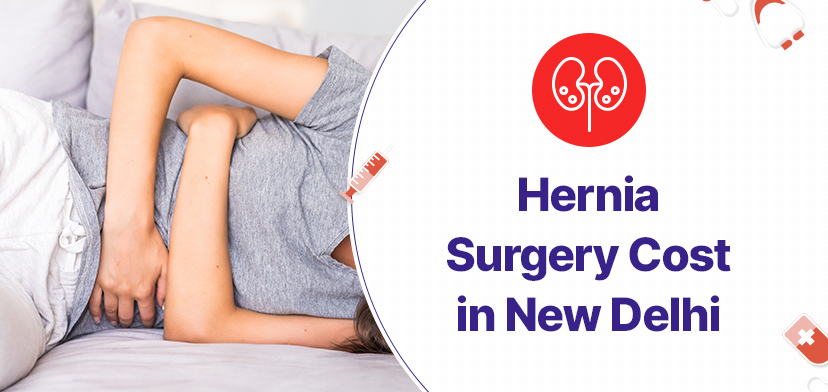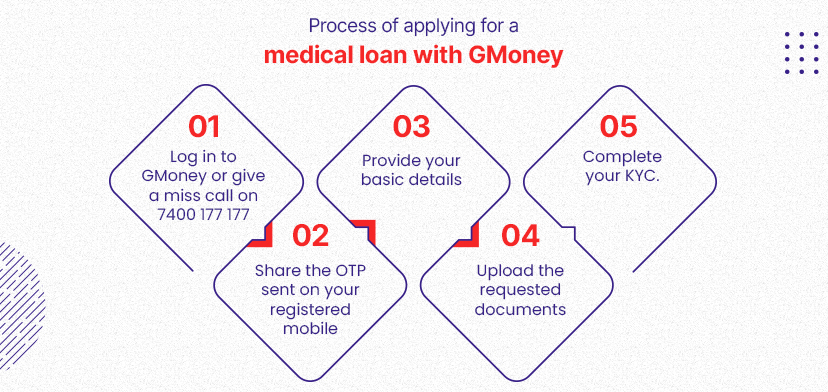Home » Hernia Surgery Cost in Delhi: Know the Expenses Involved

If you’re getting ready for hernia surgery, it’s essential to know what to expect before, during, and after the procedure. To ensure a successful, comfortable, and safe surgery, consulting with your doctor is crucial. They can provide guidance on the various types of hernia surgery, potential issues during the operation, risks, aftercare, and any necessary preparations.
Your doctor will be sure to give you the best instructions and advice for optimizing your surgery and recovery. By preparing in the right way for your hernia surgery, you can reduce risks and up your chances for a successful outcome. educate yourself more about what the process entails before, during, and after hernia surgery, and begin taking the first steps toward a smooth recovery.

Overview
Hernias can happen when an organ or tissue protrudes through a weak spot in the muscle or connective tissue. They are commonly found in the abdominal wall, groin, belly button, or area of a previous surgical incision. By understanding the nature of hernias, you can take steps to prevent them or get medical attention when needed.
There are several types of hernia surgery, including
Choosing the right surgery
There are a few different factors that go into deciding the best course of action for hernia surgery, including the type and location of the hernia, the patient’s overall health, and their personal preferences. In general, open surgery is the standard procedure for hernia repair, which involves making a large incision.
However, laparoscopic hernia surgery is another option that employs tiny incisions and specialized tools to treat the hernia, resulting in less scarring and a quicker recovery time. Additionally, some laparoscopic surgeries make use of a robotic device to more precisely manipulate the surgical instruments.
According to Dr Gunjan Dodwani surgery is the only cure for hernia and is completely curable. Watch this video to know more.
There are two main methods for repairing a hernia: open surgery and laparoscopic surgery.
Open surgery involves making a single large incision to reach the hernia, which is then repaired with sutures or a surgical mesh.
Laparoscopic surgery is a minimally invasive approach that uses several small incisions to reach the hernia, which is then treated with surgical tools.
However, the best option for an individual depends on the type and size of the hernia, which must be discussed with a doctor.

Pre-surgery appointment: Before your hernia surgery, you will meet with your surgeon for a pre-surgical appointment. During this appointment, your surgeon will review your medical history, perform a physical examination, and discuss the details of the surgical procedure with you. They will also explain the potential risks and benefits associated with the surgery and address any questions or concerns you may have.
Pre-surgery tests: Before your surgery, your surgeon will order several tests. These may include ultrasound, blood tests, urine tests, chest x-ray, MRI, and ECG. These tests help your surgeon assess your overall health and determine if you are a suitable candidate for the surgery.
Pre-surgery diet: Your surgeon will provide you with detailed dietary guidelines to follow before your surgery in order to minimize the risk of complications and aid in your recovery. These guidelines may include avoiding certain foods and beverages or limiting your intake of specific nutrients. By following these guidelines, you can help ensure a successful surgery and a speedy recovery.
Once the anesthesia has taken effect, the surgeon will make any necessary incisions and repair the hernia. This may involve reinforcing the area with sutures or mesh material. The incisions will then be closed using sutures or staples. Depending on the type of procedure, surgery usually lasts two to three hours.
After surgery, the patient will be transported to the recovery room and monitored closely. Painkillers may be administered to alleviate discomfort. The patient will be discharged home once they have recovered enough to do so.
After the Procedure
– Recovery at home
– Follow-up care
– Monitoring the complications
Hernia surgery is an important step in treating hernias. Untreated hernias can lead to strangulation, in which the tissue becomes caught and loses blood flow, resulting in excruciating pain, nausea, and vomiting. If untreated, this ailment may be lethal. It can result in intestinal blockage, repeated hernias, and persistent pain. So, it is imperative to have hernia surgery as soon as possible.
Moreover, delaying surgery raises the chance of infection. The tissue may become infected if the hernia becomes too wide, leading to problems including sepsis, a serious and sometimes fatal illness. Having surgery as soon as possible is the best way to avoid these complications.

The cost of hernia surgery can be quite high, and there may be additional expenses associated with addressing potential complications after the procedure.
In India, the cost of hernia surgery can vary from ₹35,000 to ₹200,000, depending on factors such as the specific type of surgery, the surgeon’s level of experience, and the hospital where the operation is conducted. Hernia surgery cost in New Delhi can go from Rs. 70,000 to Rs. 90,000. Therefore, it is crucial to have a detailed conversation with your surgeon before proceeding with the operation.
To help you compare hernia surgery costs in different cities throughout India, the table below displays the average prices for the operation.
| City | Cost |
| New Delhi | Rs. 70,000 to Rs. 90,000 |
| Kolkata | Rs. 25,000 to Rs. 1,20,000 |
| Chennai | Rs. 50,000 to Rs. 2,70,000 |
| Bengaluru | Rs. 70,000 to Rs. 90,000 |
| Pune | Rs. 70,000 to Rs. 80,000 |
GMoney offers a medical loan for those requiring hernia surgery, enabling them to pay for the procedure in installments. The loan is interest-free and has a speedy approval process. With GMoney’s no-cost EMI loan for hernia surgery, patients can more easily manage the cost of their treatment without incurring significant debt.
In addition to the loan, GMoney also provides its customers with some useful resources and guidance throughout the surgery and recovery period. The company makes sure that patients can have a positive experience and focus on their healing without having to worry about any financial concerns.

1. What are the signs and symptoms of a hernia?
A bulge or lump in the affected area, pain or discomfort while lifting or straining, and a sense of weight or heaviness in the affected area are all common signs of a hernia.
2. What is the cause of a hernia?
Hernias are typically caused by increased pressure in the abdomen or groin, which can be caused by bowel straining, heavy lifting, pregnancy, or obesity.
3. How is a hernia diagnosed?
A hernia is often diagnosed via physical examination and imaging testing such as an ultrasound or CT scan.
4. What are the risks of a hernia?
The risks of having a hernia include pain and discomfort, infection, and intestine obstruction. In rare cases, hernias can cause life-threatening complications such as strangulation or incarceration of the intestine.
5. How long does it take to recover from hernia surgery?
The amount of time it takes to recover from hernia surgery depends on the type of hernia and the patient’s overall condition. Hernia surgery might take anywhere from 2-4 weeks to fully recover.
6. Am I qualified for GMoney’s no-cost EMI?
Any individual who is a resident of India and is between the ages of 21 and 58 is eligible for GMoney’s no-cost EMI.
7. Are there any processing fees for GMoney’s no-cost EMI?
No, GMoney does not charge processing fees. You can apply for the loan online with no charges or penalties.
8. How long does GMoney’s no-cost EMI last?
GMoney has a flexible payment schedule. You can choose a loan length ranging from 3 to 18 months based on your ability to pay.
9. Can children have hernias?
It’s not at all rare. Umbilical hernias at birth are, in fact, quite common. Most will go away on their own. Inguinal hernias in newborns and infants are frequently seen. Those don’t go away. Happily, the repair of an infant hernia is quite simple compared to those in adults.
10. What is minimally invasive hernia repair?
Laparoscopic, or minimally invasive, procedures use multiple small incisions no more than 1 centimetre in length to access the hernia. The abdomen is then inflated with carbon dioxide to provide room for the surgeon to work, and the hernia is repaired with a small, flexible device called a laparoscope.
11. Can hernias cause death?
Yes, in some cases. A strangulated hernia can occur when the bowel becomes trapped in the hernia, cutting off the blood supply to the affected tissue. If the trapped tissue dies and intestinal contents leak into the abdominal cavity, resulting in peritonitis, it can be fatal unless it is treated quickly with surgery and antibiotics.
Hernia surgery is a significant medical intervention. Before undergoing the procedure, it is important to discuss associated risks and possible complications with your doctor, and to understand the total cost of the treatment. With a medical loan from GMoney, you can manage the cost of the surgery and focus on your recuperation.
Disclaimer: THIS WEBSITE DOES NOT PROVIDE MEDICAL ADVICE.
Follow us
Reach us
Mumbai HO
GMoney Pvt. Ltd.
315, 215 Atrium,
Next to Courtyard by Marriott,,
A.K. Road, Andheri East,
Mumbai - 400093
Ph : +91 86570 00105, +91 72089 60444
Quick Links
Bengaluru
GMoney Technologies Pvt. Ltd.
Oyo Work Spaces, Umiya Emporium,
Opposite Forum Mall, Hosur Rd,
Koramangala, Bengaluru,
Karnataka 560029
Ph : +91 89717 34815
Delhi
GMoney Technologies Pvt. Ltd.
Berry Co Works, 1E/3,
Jhandewalan extension,
Next to jhandewalan metro station
gate no. 2 Barakhambha Road,
New Delhi, Delhi 110001
Ph : +91 97116 26832
Pune
GMoney Technologies Pvt. Ltd.
91 Spring Board, Sky Loft,
Creaticity Mall, Off, Airport Rd,
opposite Golf Course, Shastrinagar,
Yerawada, Pune,
Maharashtra 411006
Ph : +91 84250 28758
Chandigarh
GMoney Technologies Pvt. Ltd.
SCO no. 292,
First Floor, Sector 35D,
Chandigarh
Ph : +91 84279 82012
Jaipur
GMoney Pvt. Ltd.
CODESKK Civil Tower,121 122,
Pandit TN Mishra Marg,
Santhosh Nagar, Nirman Nagar,
Jaipur – 302019
Ahmedabad
GMoney Pvt. Ltd.
22nd Floor, B Block,
Westgate By True Value,
Nr. YMCA Club, SG Highway,
Ahmedabad – 380051
Hyderabad
GMoney Pvt. Ltd.
Dwaraka Pride,
Plot no. 4/1, Survey No. 64,
Huda Techno Enclave, Madhapur,
Hyderabad (Telangana) – 500081
Chennai
GMoney Pvt. Ltd.
DBS Business Center, 31A,
Cathedral Garden Rd, Badrikari, Tirumurthy Nagar, Nungambakkam, Chennai, Tamil
Nadu – 600 034
Mumbai HO
GMoney Pvt. Ltd.
315, 215 Atrium,
Next to Courtyard by Marriott,,
A.K. Road, Andheri East,
Mumbai - 400093
Ph : +91 86570 00105, +91 72089 60444
Bengaluru
GMoney Pvt. Ltd.
Oyo Work Spaces,
Umiya Emporium,
Opp. Forum Mall, Hosur Rd,
Koramangala, Bengaluru,
Karnataka - 560029
Ph : +91 72089 60444
Pune
GMoney Pvt. Ltd.
91 Spring Board, Sky Loft,
Creaticity Mall, Airport Rd,
Opp. Golf Course, Shastrinagar,
Yerawada, Pune,
Maharashtra - 411006
Ph : +91 72089 60444
Delhi
GMoney Pvt. Ltd.
Berry Co Works, 1E/3,
Jhandewalan extension,
Gate no. 2 Barakhambha Road,
New Delhi, Delhi - 110001
Ph :
+91 72089 60444
Chandigarh
GMoney Pvt. Ltd.
SCO No. 292,
First Floor, Sector 35D,
Chandigarh - 160022
Ph : +91 72089 60444
Ahmedabad
GMoney Pvt. Ltd.
22nd Floor, B Block,
Westgate By True Value,
Nr. YMCA Club, SG Highway,
Ahmedabad - 380051
Hyderabad
GMoney Pvt. Ltd.
Dwaraka Pride,
Plot no. 4/1, Survey No. 64,
Huda Techno Enclave, Madhapur,
Hyderabad (Telangana) - 500081
Jaipur
GMoney Pvt. Ltd.
CODESKK Civil Tower,121 122,
Pandit TN Mishra Marg,
Santhosh Nagar, Nirman Nagar,
Jaipur - 302019
Chennai
GMoney Pvt. Ltd.
DBS Business Center, 31A,
Cathedral Garden Rd, Badrikari,
Tirumurthy Nagar,Nungambakkam, Chennai,
Tamil
Nadu - 600 034
Pune | Mumbai | New Delhi | Kolkata | Chennai | Navi Mumbai| Bengaluru | Ahmedabad | Nagpur | Hyderabad | Jaipur | Lucknow | Bhopal | Bhubaneswar | Nashik | Indore | Ghaziabad | Kanpur | Amritsar | Vasai | Noida | Gurugram | Chandigarh | Ranchi | Cuttack | Thane | Kalyan | Jalandhar | Kolhapur | Visakhapatnam | Chakan| Greater Noida | Wagholi | Raipur | Panvel | Belgaum | Mohali | Bhiwandi | Talegaon | Coimbatore | Palghar | Mumbra | Sangli | Surat | Durgapur | Ludhiana | Kochi | Agra | Ahmednagar | Ajmer | Akola | Aurangabad | Baroda | Beed | Rewari | Patiala | Vellore | Ranjangaon | Nanded | Nellore | Panipat | Panjim | Madurai | Mysore | Mangalore | Korba | Mathura | Kalaburagi | Jalgaon | Kharar | Guwahati | Kollam | Jamshedpur | Gwalior | Saswad | Solapur | Varanasi | Salem | Sambalpur | Jodhpur | Hubli | Panchkula | Faridabad | Amravati | Ayodhya | Badlapur | Dehradun | Parbhani | Ujjain | Udaipur | Tiruchirappalli | Srinagar | Shimla | Secunderabad | Ratnagiri | Pandharpur | Ananthapuram | Buldhana | Hadapsar | Baramati | Chittoor | Darjeeling | Dhule | Fatehpur | Gandhinagar | Haridwar | Gorakhpur | Jhansi | Kanchipuram | Kartarpur | Kurukshetra | Pondicherry | Prayagraj | Bharuch | Bhusawal | Bathinda | Pathankot | Nandurbar | Niphad | Kolar | Ambala | Kota | Pendurthi | Jabalpur | Palwal | Bhilai | Bhiwani | Bilaspur | Patna | Rohtak | Phagwara | Malegaon | Vijayawada | Bikaner | Chiplun | Darbhanga | Roorkee | Bhor | Rajahmundry | Margao | Alwar | Dhanbad | Bulandshahr | Aluva | Mulshi | Davanagere | Kapurthala | Anantapur | Loni | Latur | Gondia | Chhindwara | Chandrapur | Dharmapuri-TN | Faridkot | Dharwad | Daund | Chaksu | Bareilly | Kakinada | Haldwani | Doddaballapur | Dindori-MH | Bagru | Kudus | Kozhikode | Gurdaspur | Bokaro | Berhampur | Batala | Barrackpore | Ramgarh | Meerut | Bassi | Dera Bassi | Howrah | Karjat Raigarh | Thiruvananthapuram | Bheemunipatnam | Ambegoan | Allahabad | Aligarh | Alappuzha | Tirupathi | Thoppumpady | Srikakulam | Siliguri | Rourkela | Mirzapur | Gadag | Bellary | Tumkur | Sonipat | Hoshangabad | Junnar | Jalna | Hisar | Karnal | Kottayam | Muzzafarnagar | Ramnagara | Thrissur | Bahadurgarh | Balasore | Baraut | Dhar | Ernakulam | Gadhinglaj | Chikodi | Vaniyambadi | Kamothe |